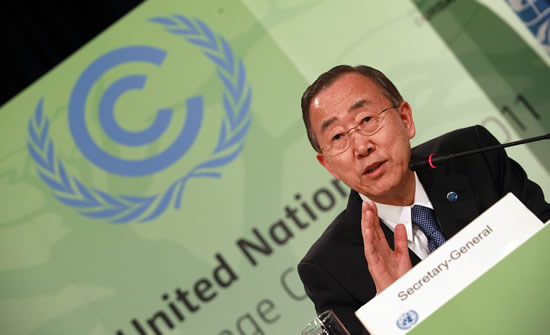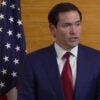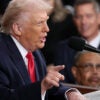
United Nations Secretary General Ban Ki Moon speaks at the opening plenary session of the High Level Segment of the during the COP 17 conference in Durban on December 6, 2011. UN Secretary General Ban Ki-moon urged deadlocked climate talks in Durban to work urgently for solutions, saying the future of the planet was at stake. AFP PHOTO/RAJESH JANTILAL
Another year, another hopeless climate talk.
This time, the annual U.N. climate change summit is taking place in Durban, South Africa. It looks painfully like another misguided attempt to convince developed countries to shoulder global emissions targets while redistributing wealth to developing countries. This approach, again, is likely to fail—despite China’s recent announcement that it would consider accepting a legally binding agreement.
For the past 17 years, one U.N. climate talk after another has failed over the same basic issue. While top-down international policymaking may sound appealing to those whose hopes rest on finding the one comprehensive treaty that will avert climate change, in reality it doesn’t work that way. Heritage’s Brett Schaefer explained last year why the U.S. should not negotiate a global warming agreement through the U.N.:
Nations with little direct stake in the outcome of negotiations as well as U.N. officials manipulated the process to focus on an ineffective, costly agreement that unduly burdened the U.S. and other developed countries without any real assurance that such sacrifices would address the issue of global warming.
Developing countries are not only asking to be exempt from any emissions restrictions, but they also want handouts from countries like the United States. China’s announcement is questionable, as this is not the first time the country has floated the idea of accepting a legally binding agreement, and it’s also conditional on extensive handouts to developing countries that are unlikely to materialize:
Xie said that China’s conditions include the E.U. and other countries agreeing to a second commitment period of the Kyoto Protocol; a follow-through on commitments countries made to deliver $30 billion in immediate aid to vulnerable nations by 2012 and a process to ramp up toward another promised goal of $100 billion annually by 2020.
Meanwhile, the alleged scientific consensus on man-made global warming is crumbling, as further evidence surfaces that influential climate science is flawed with political opportunism. Climategate 2.0 paints a picture similar to the original scandal from 2009, described by Heritage analyst Nick Loris:
Leaked e-mails from the University of East Anglia’s Climate Research Unit in the U.K. revealed conspiracy, exaggerated warming data, possibly illegal destruction and manipulation of data, and attempts to freeze out dissenting scientists from publishing their work in reputable journals.
The U.S. Congress is right to cautiously observe the negotiations without signing Americans up for costly carbon emissions reductions that would do little to address global warming concerns. President Obama’s team, however, reportedly is considering circumventing Congress by implementing a distorting foreign currency transactions tax that would harm U.S. imports and exports, slowing our economic recovery.
It is high time for these failed U.N. climate talks to come to an end once and for all. At the very least, the U.S. should remove itself from this recurring process, which paints America as a pariah as long as it won’t buckle to the outlandish demands of other nations. U.S. taxpayers should not be on the hook for handouts, risking America’s return to a strong and vibrant economy for the sake of costly and ineffective emissions reductions or distorting tax policy.
































5 Replies to “U.N. Climate Talks: Wealth Redistribution and a New Tax, Too”